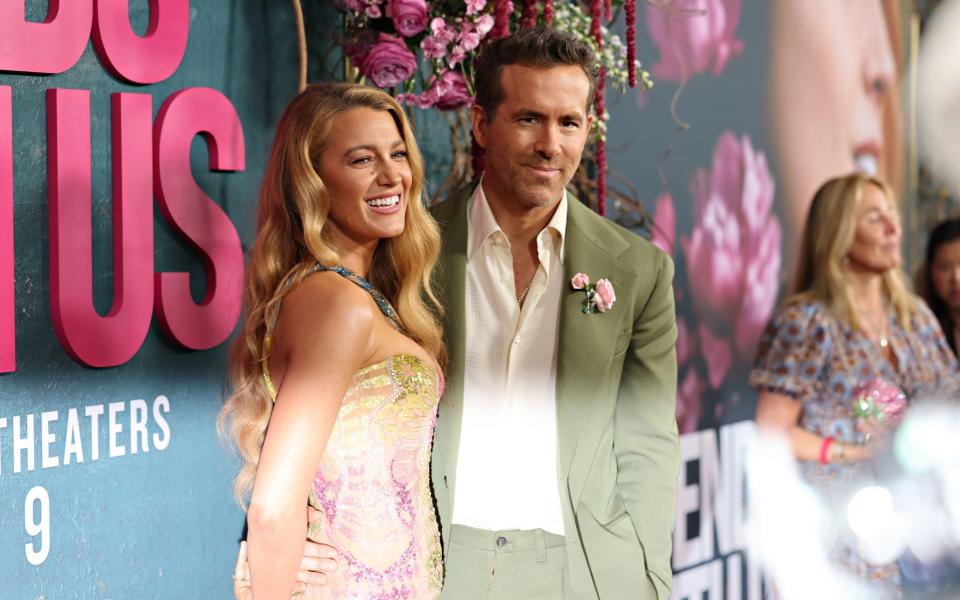In a conventional publicity campaign for a Hollywood film, every aspect is precision-engineered for maximum impact. The teasers begin early. The rumours from early screenings glow with positivity. The cast stay inseparable from both one another and their two core messages: that the film is tremendous and, boy, did we have a nice time making it.
Last summer, as he prepared to open the romantic drama It Ends with Us, Justin Baldoni took a radically different approach. Rather than go for unity, he and his co-stars appeared to have split. Rather than insist they had a nice time, they demurred. And rather than glow with positivity, he hired the same crisis PR expert as Johnny Depp to allegedly dismantle the reputation of his leading actress.
Baldoni is now the subject of an extraordinary legal complaint filed by Blake Lively, that leading lady, against Baldoni, his film studio, his publicist, and the aforementioned crisis PR team, led by Melissa Nathan, a veteran whose preferred approach could best be described as “attack is the best form of defence”.
An adaptation of a Colleen Hoover novel, It Ends with Us saw Baldoni both direct and cast himself as the leading man, while Lively was the film’s star and perfectly symmetrical face.
ADVERTISEMENT
In theory, it should have been an easy win for everybody involved: Hoover’s novel sold more than 10 million copies worldwide, giving the film a ready-made audience. Baldoni, 40, while a relative unknown by Hollywood standards, had experience directing and starring in schmaltzy romances, while the subject area, about a woman trapped in an abusive relationship, gave this one a sheen of importance.
And perhaps most crucially, Lively, 37, had the clout to surely make anything a success. Since making her name in The Sisterhood of the Travelling Pants and Gossip Girl, she has grown into a mega-celebrity, one half of a Hollywood power couple with her husband, Ryan Reynolds; one sliver of Taylor Swift’s best-friend group; and the proud leader of 45 million Instagram followers.

Yet It Ends with Us seemed a chaotic misfire before it even arrived. Lively and Baldoni, it was said, despised one another. The film’s main cast (and Hoover) unfollowed Baldoni on social media – a new custom for any celebrities wishing to let their fans know they’re unhappy with someone without saying it – and began doing press interviews without him.
Lively then found herself under attack. Her approach to the promotional tour was too light and fluffy for a film about domestic violence, it was decided (critics made the same complaint about the film itself, but that’s by the by). She had commandeered much of the film, it was reported, including inviting Reynolds to rewrite a key scene and commissioning her own cut of the film, which the studio chose to release.
ADVERTISEMENT
Negative coverage grew. Past offences were dredged up and hosed down for a public airing. And all of a sudden, a fresh, apparently more honest narrative was established about Lively: that she may present as a wry all-American “girlboss”, but the truth is far more calculating.
To try to keep up with all this back and forth was utterly futile, even for people who care. But, even though the film did surprisingly well – it grossed $351 million (£280 million )worldwide, making it the 15th most successful movie of the year at the box office – the overwhelming aroma left by It Ends with Us was wholly unsavoury.
And one thing was for certain: the story was not going to end with the release of the film. Not when one member of Hollywood’s most powerful gang still had a score to settle.

And so it followed. On Saturday, more than four months after the film’s release, the New York Times published an 80-page complaint filed in California that made a range of allegations against Baldoni – including sexual harassment on set and a co-ordinated PR campaign to damage Lively’s reputation afterwards.
ADVERTISEMENT
At one point during production, the complaint alleges, things were so bad that a meeting was held to address the actress’s claims of a hostile work environment, which Reynolds also attended. One demand was that there be “no more showing nude videos or images of women to Lively, no more mention of Baldoni’s alleged previous ‘pornography addiction’, and no more discussions about sexual conquests in front of Lively”.
Other allegations made in the complaint include Baldoni and the film’s lead producer, Jamey Heath, repeatedly violating physical boundaries and making sexual or inappropriate comments to Lively; Baldoni improvising unwanted kissing during acting scenes; Heath showing Lively a video of his wife naked; and both men entering her trailer uninvited while she was in a state of undress.

But perhaps the most shocking aspect is what allegedly followed. Once Baldoni and his production company, Wayfarer Studios, accepted Lively’s demands for a safer working environment, they embarked on a “social manipulation” smear campaign to “destroy” her reputation.
“I hope that my legal action helps pull back the curtain on these sinister retaliatory tactics to harm people who speak up about misconduct and helps protect others who may be targeted,” Lively said in a statement since the complaint.
ADVERTISEMENT
According to that complaint, the “plan” began long before release, but kicked into life when Baldoni and Heath hired Nathan, the crisis PR who worked with Johnny Depp. Two years ago, Depp’s successful defamation trial against his ex-wife, Amber Heard, was mired in suspicions of an alleged co-ordinated online smear campaign against her.

In a text exchange included in Lively’s complaint, Baldoni’s publicist, Jennifer Abel, informed Nathan that Baldoni “wants to feel like [Lively] can be buried”. In response, Nathan was bullish. “You know we can bury anyone.”
At one point Baldoni sent Abel a negative article about Hailey Bieber, the social media influencer and wife of pop star Justin, in which she was called a “bully”. “This is what we would need,” he wrote. Nathan said she could “change [the] narrative” on social media. “All of this will be most importantly untraceable,” she wrote.
One of her plans, the complaint alleges, involved the possibility of “planting stories about the weaponisation of feminism and how people in [Lively’s] circle like Taylor Swift, have been accused of utilising these tactics to ‘bully’ into getting what they want”.
Orchestrated or not, a change in the narrative around Lively is what Baldoni got. Before the release of It Ends with Us, Lively’s reputation was taken apart online, both on social and traditional media. One came from the Norwegian entertainment reporter Kjersti Flaa, who uploaded an eight year-old interview she conducted with Lively. In it, Lively was antsy, seemingly annoyed after a comment on her “baby bump”. The interview went viral, boosting the growing sense that Lively was less than nice.
Flaa had previously posted interviews with Johnny Depp, tagged #JusticeForJohnnyDepp, but strenuously denies any involvement in a smear campaign orchestrated by Nathan. “That’s such an insult to me,” she said in a video posted over the weekend. “It was neither co-ordinated nor influenced by anyone associated with the alleged campaign,” she told The New York Times.
Through all this, as Lively’s every past indiscretion – from her talent scout mother and actor father making her a “nepo baby”, to the inconvenient fact she and Reynolds married on a former slave plantation (“What we saw at the time was a wedding venue on Pinterest. What we saw after was a place built upon devastating tragedy,” they lamented) – was disinterred, the actress travelled the world, promoting the movie in a blossom of floral outfits, and being typically good-natured while she did so. Behind the scenes, their lawyers were presumably nose to the grindstone.
She and Reynolds are masters at this: appearing breezy and relatable while being worth a combined $380 million. Despite leading two of the summer’s biggest films (Reynolds had Deadpool & Wolverine), acting is almost incidental to their fortunes these days. In reality, they’re influencers and business moguls. Among other things, Reynolds is arguably equally well known in Britain for his co-ownership of Wrexham AFC. Lively, meanwhile, is maybe more famous for her well-maintained Instagram account and certain friends.
In response to the complaint, Bryan Freedman, Baldoni’s lawyer, said it is “shameful that Ms Lively and her representatives would make such serious and categorically false accusations”, and called her legal action “yet another desperate attempt to ‘fix’ her negative reputation which was garnered from her own remarks and actions during the campaign for the film; interviews and press activities that were observed publicly, in real time and unedited, which allowed for the internet to generate their own views and opinions”. But in reality, Lively’s legal complaint seems like a decisive blow.
In a way, the most remarkable aspect of the whole sorry saga is that Justin Baldoni thought he could take on the might of Hollywood’s most wholesome and powerful cartel and win. In Blake Lively and Ryan Reynolds’s Hollywood, it always ends with them.
EMEA Tribune is not involved in this news article, it is taken from our partners and or from the News Agencies. Copyright and Credit go to the News Agencies, email news@emeatribune.com Follow our WhatsApp verified Channel




